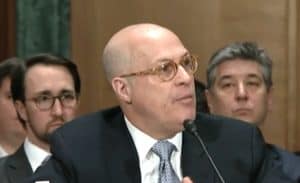It’s about time.
The Commodity Futures Exchange Commission (CFTC) has published a white paper on Swaps Regulation Version 2.0. Entitled, An Assessment of the Current Implementation of Reform and Proposals for Next Steps, the unique aspect of this document is the fact that CFTC Chair J. Christopher Giancarlo is advocating on behalf of using distributed ledger technology (DLT) otherwise known as Blockchain.
“The future of regulatory reporting and record-keeping will likely look very different going forward.”
The paper addresses specifically a range of improvements to Swaps and to the current reform implementation that is pro-reform, aligned to Congressional intent while attempting to balance systemic risk mitigation. The CFTC notes that a healthy swaps market is supportive of broad-based economic growth.
 Without making any judgement on the overall recommendations by the CFTC regarding Swaps, it is very interesting to note the CFTC is embracing blockchain technology:
Without making any judgement on the overall recommendations by the CFTC regarding Swaps, it is very interesting to note the CFTC is embracing blockchain technology:
“There is exciting potential on the horizon for continued technological advancement to improve swap data by making reporting systems more reliable, more automated and less expensive. The evolution of distributed ledger technology (DLT) could allow the CFTC and other regulators or entities to access swaps data automatically and seamlessly from reporting counterparties every time a swap is executed or updated on a particular blockchain, without human intervention or the use of other intermediaries. This functionality could increase the speed with which regulators could access data and increase the reliability of the data, while reducing the costs of making the data available to regulators. More specifically, CFTC access could, in the future, be incorporated from the outset into distributed ledgers of reporters. In this way, the Commission would be updated on new or amended swap transactions as they happen, allowing for near-real-time oversight of the swaps markets, including the Commission’s surveillance and risk monitoring responsibilities.”
The advent of DLT or blockchain may open a new era of both transparency and Regtech innovation. The CFTC may be the first financial regulator to public embrace this new type of technology.
The CFTC states that they
“… should collaborate with other authorities to cultivate the development of “regulator nodes” on distributed ledgers. The full potential of DLT in trade reporting is to transcend the fragmented regulatory structure by providing reference to a single, validated record of all financial transactions/positions across regulated markets.”
Blockchain is the future of regulatory reporting. Not just for Swaps but for all types of regulatory reporting and financial transactions. But it is also important to note that Giancarlo believes a push for a regulatory 2.0 will require Congressional action.
So will the legislative branch step in and create a 2020 act to streamline compliance, lower cost and move financial services regulation into the 21st century? Hard to tell.
Kudos to the CFTC.
You may download the CFTC document here.

